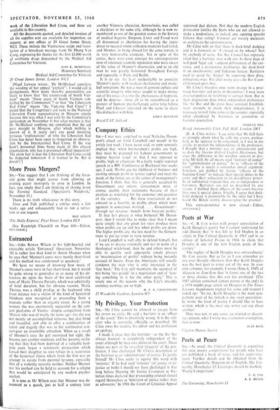Entranced
SLR,—John Rowan Wilson in his light-hearted and enjoyable article 'Entranced' (Spectator, November 18) is rather less than kind to Anton Mesmer when he says that `Mesmer's cures were mostly short-lived and his method was condemned as quackery.'
We have no means of knowing how many of Mesmer's cures were in fact short-lived, but it would be quite wrong to generalise as so many of his de- tractors do upon the basis of his most celebrated cure of Maria Theresa Paradis, which was admittedly of brief duration, but • for obvious reasons. Maria Theresa was a child prodigy at the keyboard who from infancy was a victim of the kind of hysterical blindness now recognised as proceeding from a neurotic rather than an organic cause. As a young woman she was enormously successful on the con- cert platforms of Vienna—despite competition from Mozart who was of nearly the same age—for she was not merely an accomplished virtuoso, but also blind and beautiful, and able to offer a combination of talent and tragedy that was to the sentimental con- cert-goer an irresistible attraction. When as a result of Mesmer's cure the girl recovered her sight, she became just another musician, and her parents, realis- ing that they had been deprived of a valuable busi- ness asset, began a systematic persecution which forced their daughter to take refuge in a recurrence of the hysterical illness which from the first was an attempt to escape from parental tyranny, especially that of a violently neurotic mother. Neither Mesmer nor his method can be held to account for a relapse that would be anticipated by any modern psycho- analyst.
It is true as Mr Wilson says that Mesmer was de- nounced as a quack, just as half a century later
another Viennese physician, Semmelweis, was called a charlatan in the same city, although he is now re- membered as one of the greatest names in the history of medical hygiene. Simpson, Lister and Freud were all denounced as charlatans for having the impu- dence to succeed where orthodox medicine had failed, and Mesmer, in being abused for the same reason, is in very honourable company. Yet in spite of his critics, there were even amongst his contemporaries men of esteemed scientific reputation who were aware of the value of Mcsmer's discoveries, and as an old man he was greatly honoured throughout Europe and especially in Paris and Berlin.
It is to say :he least uncharitable to associate Mesmer's name with medical charlatanry and music- hall sensations. He was a man of genuine culture and scientific integrity who never sought to make money out of his reseal., hes into the phenomena of hypnosis, and he deserves above all to be remembered as a pioneer of humane psychotherapy active long before Pinel and Charcot appeared on the scene to share this distinction with him.
JAMES MOTIRAM
Royal CAT, Salford














































 Previous page
Previous page